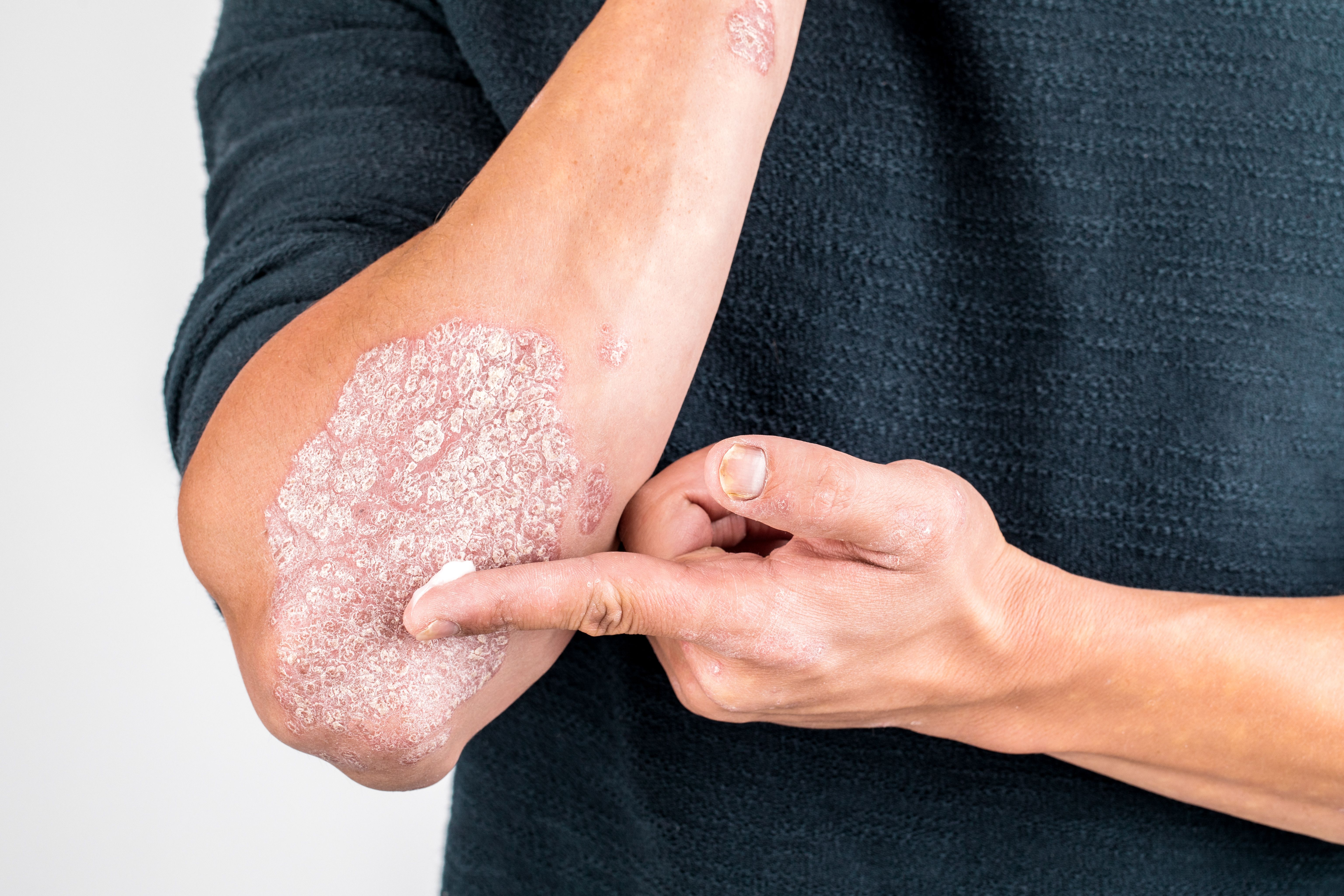- Acne
- Actinic Keratosis
- Aesthetics
- Alopecia
- Atopic Dermatitis
- Buy-and-Bill
- COVID-19
- Case-Based Roundtable
- Chronic Hand Eczema
- Chronic Spontaneous Urticaria
- Drug Watch
- Eczema
- General Dermatology
- Hidradenitis Suppurativa
- Melasma
- NP and PA
- Pediatric Dermatology
- Pigmentary Disorders
- Practice Management
- Precision Medicine and Biologics
- Prurigo Nodularis
- Psoriasis
- Psoriatic Arthritis
- Rare Disease
- Rosacea
- Skin Cancer
- Vitiligo
- Wound Care
Article
Study: Guselkumab More Effective Than Secukinumab in Certain Subpopulations
Author(s):
A study published in the Journal of Dermatological Treatment shows guselkumab may be more effective in heavier patients with moderate to severe plaque psoriasis vs secukinumab.
Results from the ECLIPSE study (NCT03090100), which examined the efficacy of guselkumab (Tremfya; Janssen Biotech, Inc) vs secukinumab (Cosentyx; Novartis) in patient subpopulations of patients with moderate to severe plaque psoriasis, was published in the Journal of Dermatological Treatment.1
Guselkumab is an interleukin (IL)-23 inhibitor while secukinumab is an IL-17A inhibitor. The ECLIPSE trial is a phase 3, multicenter, 56-week, double-blinded, active-comparator study. Patients enrolled in the trial were either treated with guselkumab 100 mg (n=534) or secukinumab 300 mg (n=514) through week 44.
Patients eligible to enroll in the trial were those 18 years or older diagnosed with a moderate to severe plaque psoriasis. They were required to have a Psoriasis Area and Severity Index (PASI) of greater than or equal to 12, Investigator’s Global Assessment (IGA) score of greater than or equal to 3, body surface area (BSA) involvement of greater than or equal to 10%, a 6 month or greater history of psoriasis, and were candidates for phototherapy or systemic therapy.1
In the study, patients were randomized into each treatment arm at a 1:1 ratio either receiving guselkumab 100 mg subcutaneously at weeks 0, 4, 12, and every 8 weeks after through week 44, or secukinumab 300 mg subcutaneously as two 150 mg injections at weeks 0, 1, 2, 3, 4, and every 4 weeks after through week 44.
The patients who were randomized to be treated with guselkumab also received placebo injections to match the number and frequency of the other treatment arm.
The efficacy of treatment was based on the number of patients who reached PASI 90 and PASI 100, IGA 0/1 and IGA 0 from baseline and analyzed across patient subpopulations at week 48. The subpopulations were the age of the patient (less than 45 years old, 45 years to less than 65 years, and greater than or equal to 65 years old), body weight, body mass index (BMI), psoriasis disease severity, BSA, disease duration, PASI, and IGA), psoriasis by body region, and prior psoriasis medication history.1
Of the 1,048 patients analyzed at week 48, 93.4% were white, 67.5% were male, about 46 years old, with a mean BMI of 29.9. Patients had approximately 24% BSA involvement, 99.9% had moderate to severe IGA scores, and the mean PASI was 20.0. At baseline, prior psoriasis medication history was comparable between the treatment groups.
It was found that greater proportions of patients achieved PASI 90, PASI 100, IGA 0/1, and IGA 0 in the guselkumab treatment arm compared to secukinumab regardless of baseline age, body weight, BMI, disease severity, body region, and prior medication according to researchers. Patients who were 65 years or older and weighing more than 100 kg saw the greatest difference in effectiveness.
Patients who achieved IGA 0/1 based on age1:
- Less than 45 years: 85.8% [guselkumab] vs. 81.3% [secukinumab], between group difference 95% Confidence Intervals: [-2.4, 11.5];
- 45 to less than 65 years: 85.4% vs. 73.4%, 95% CI: [4.1, 19.9];
- Greater than or equal to 65 years: 79.6% vs. 44.4%, 95% CI: [15.1, 55.3]
Patients who achieved IGA 0/1 based on weight1:
- Less than or equal to 60 kg: 77.5% [guselkumab] vs. 76.9% [secukinumab];
- Greater than 60 to 70 kg: 85.1% vs. 74.5%;
- Greater than 70 to 80 kg: 90.2% vs. 79.3%;
- Greater than 80 to 90 kg: 91.8% vs. 79.8%;
- Greater than 90 to 100 kg: 79.4% vs. 81.3%;
- Greater than 100 to 110 kg: 78.7% vs. 69.8%;
- Greater than 110 kg: 86.1% vs. 55.7%.
When analyzing the proportions of patients who achieved PASI 90 at week 48 by baseline BMI were higher for patients treated with guselkumab vs secukinumab: less than 25 kg/m2 88.1% of guselkumab treated patients vs 75.2% secukinumab treated patients; greater than 25 to less than 30 kg/m2 was 84.1% vs. 73.4%; greater than or equal to 30 kg/m2 82.5% vs. 65.3%. Similar results were reported for PASI 100.
According to the study authors, the safety profile between both treatments were similar.
“These findings should optimize patient care by helping guide clinicians in treatment selection for a range of patient populations,” wrote study authors.
Disclosure:
A. Blauvelt has served as a scientific adviser and/or clinical study investigator for AbbVie, Almirall, Arena, Athenex, Boehringer Ingelheim, Bristol Myers Squibb, Dermavant, Eli Lilly, Evommune, Forte, Galderma, Incyte, Janssen, LEO Pharma, Novartis, Pfizer, Rapt, Regeneron, Sanofi Genzyme, Sun Pharmaceutical, and UCB Pharma. A. W. Armstrong has served as a research investigator and/or scientific advisor to LEO Pharma, AbbVie, UCB, Janssen, Eli Lilly, Novartis, Ortho Dermatologics, Sun Pharmaceutical, Dermavant, Bristol Myers Squibb, Sanofi, Regeneron, Dermira, and Modmed. R. G. Langley has served/received compensation in the form and or Honoria as Principle I investigator for/or on the scientific advisory board/or served as a speaker for AbbVie, Amgen, Boehringer Ingelheim, Celgene, Janssen, LEO Pharma, Eli Lilly, Merck, Novartis, Pizer, Sun Pharmaceutical, and UCB Pharma. K. Gebauer has served as an advisory board member and investigator for AbbVie, Janssen, LEO Pharma, Sun Pharmaceutical, and UCB, and has received educational grants from AbbVie, Janssen, Sanofi, and Sun Pharmaceutical. L. C. Guenther has served as a consultant, investigator, and speaker for AbbVie, Amgen, Bausch Health, Celgene, Eli Lilly, GlaxoSmithKline, Janssen, LEO Pharma, Merck, Novartis, Pfizer, and Sun Pharmaceutical; has been a speaker and consultant for Actelion; and has been an investigator for Boehringer Ingelheim, and UCB. C. Paul has served as an investigator or consultant for AbbVie, Almirall, Astellas, Boehringer Ingelheim, Bristol Myers Squibb, Celgene, Eli Lilly, Galderma, Janssen Cilag, LEO Pharma, Merck, Novartis, Pfizer, Regeneron, Sanofi, and UCB Pierre Fabre; K. Reich has served as advisor and/or paid speaker for and/or participated in clinical trials sponsored by AbbVie, Affibody, Almirall, Amgen, Avillion, Biogen, Boehringer Ingelheim, Bristol Myers Squibb, Celgene, Covagen, Dermira, Eli Lilly, Forward Pharma, Fresenius Medical Care, Galapagos, GlaxoSmithKline, Janssen, Janssen-Cilag, Kyowa Kirin, LEO Pharma, Medac, Merck Sharp & Dohme, Novartis, Miltenyi Biotec, Ocean Pharma, Pfizer, Regeneron, Samsung Bioepis, Sanofi, Sun Pharmaceutical, Takeda, UCB, Valeant, and Xenoport; B. Randazzo, S. Flavin, M.-C. Hsu, and Y. You are all employees of Janssen Research & Development, LLC, and own stock in Johnson & Johnson, of which Janssen is a subsidiary.
Reference:
1. Blauvelt A, Armstrong AW, Langley RG, et al. Efficacy of guselkumab versus secukinumab in subpopulations of patients with moderate-to-severe plaque psoriasis: results from the ECLIPSE study. Journal of Dermatological Treatment. 2021;0(0):1-8. doi:10.1080/09546634.2021.1959504
Newsletter
Like what you’re reading? Subscribe to Dermatology Times for weekly updates on therapies, innovations, and real-world practice tips.









